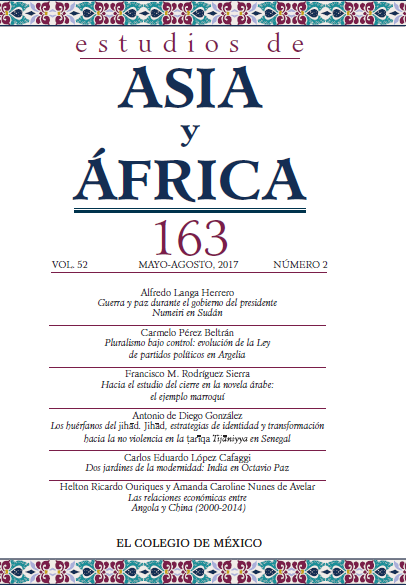Abstract
This paper explores the concept of jihād, and the strategies of identity and non-violent resistance in ṭarīqa Tijāniyya —one of the most important Sufi organizations of Africa— during colonial era in Senegal. Starting with al-Fūtī’s military defeat, this paper demonstrates the transition from military jihād to non-violent resistance against French authorities in West Africa. In this context, it analyzes he social and intellectual contributions of Mālik Sy and 'Abdoulaye Niasse, leaders of the Ti jāniyya in early XX century. Both, heirs of jihād culture, developed new strategies to increase social resistance while rejecting violence.
References
Fuentes primarias
Fūtī Tāl, ‘Umar, Kitāb Rimah, Beirut, Dār al-kutub al-Ilmiyah, 1964.
Fūtī Tāl, ‘Umar, “Tadhkira al-Gāfilīn”, ed. y tr. Claudine GerreschDekais, Bulletin de l’Institut Fondamental d’Afrique Noir, t. 39, núm. 4, octubre de 1977, pp. 890-930.
Fūtī Tāl, ‘Umar, “Tadhkirat al-mustarshidīn wa falāh al-tālibīn”, ed. y tr. Claudine Gerresch-Dekais, Bulletin de l’Insitut Fondamental d’Afrique Noir, t. 42, núm. 3, julio de 1980, pp. 524-553.
Fūtī Tāl, ‘Umar, Voilà ce qui est arrivé - Bayān mā waqa‘a, ed. y tr. Sidi Mohamed Mahibou y Jean Louis Triaud, París, Centre National de la Recherche Scientifique, 1983.
Hµarazīm B. Barrada, ‘Ali, Jawāhir al-ma‘āni, Beirut, Dār al-kutub al-Ilmiyah, 2006.
Kuta, ‘Umar, Entretien avec Mame el-Hadji Abdoulaye Niasse en Gambie (síntesis de Mufīd al-anām wa munīl al-marām), Kaolack, Institute Islamique Franco-Arabe de Sam, 1985.
Mbaye, Ravane, Pensée et action, t. 1: Vie et Oeuvre, Ozoir-la-Férrière, Albouraq, 2003.
Niasse, ‘Abdulaye, Mufīd al-anām wa munīl al-marām, manuscrito inédito, Medina, Kaolack, s.f.
Sukayrij, Ahmad, Kāshif al-hijāb, Beirut, al-Maktaba al Sha‘biya, 1988.
Sukayrij, Ahmad, Matālam al-asrār limadārak fī sharh salā al-fātih li-mā ughliq, ed. M. Erradi Guenoun, Fez, s.e., 2007.
Sy, Mālik, Penssée et action, t. 2: Kifāyat al-rāghibīn (Ce qu’il faut aux bons croyants), ed., tr. y notas de Ravane Mbaye, Ozoir-laFérrière, Albouraq, 2003.
Sy, Mālik, Penssée et action, t. 3: Ifhām al-munkir al-jānī (Réduction au silence du dénégateur), ed., tr. y notas de Ravane Mbaye, Ozoirla-Férrière, Albouraq, 2003.
Thiam, Muhammad A., La vie d’ El Hadj Omar: Qaçida en Poular, ed. y tr. Henri Gaden, París, Institut de Ethnologie de Paris, 1935.
Secundarias
Abun-Nasr, Jamil, The Tijaniyya: A Sufi Order in the Modern World, Oxford, Oxford University Press, 1965.
Arnaud, Robert, Précis de politique musulmane, Argel, Typographe Adolphe Jourdan, 1906.
Bonner, Michael, Jihad in Islamic History: Doctrines and Practices, Princeton, Princeton University Press, 2006.
De Diego González, Antonio, Identidades y modelos de pensamiento en África, tesis doctoral, Sevilla, Universidad de Sevilla, 2016.
Hill, Joseph, Divine Knowledge and Islamic Authority: Religious Specialization among Disciples of Baay Ñas, tesis doctoral, New Haven, Yale University, 2007. [, consultado en octubre de 2015.]
Hunwick, John, Sharī‘a in Songhay: The Replies of al-Maghīlī to the Questions of Askia al-Hµājj Muhammad, Oxford, Oxford University Press, 1985.
Hunwick, John y Rex. S. O’Fahey (eds.), Arabic Literature of Africa. Vol. II. The Writings of Central Sudanic Africa, Leiden, Brill, 1995.
Hunwick, John y Rex. S. O’Fahey (eds.), Arabic Literature of Africa. Vol. IV. The Writings of Western Sudanic Africa, Leiden, Brill, 2003.
Klein, Martin, Islam and Imperialism in Senegal: Sine-Saloum, Stanford, Stanford University Press, 1968.
Ly-Tall, Madina, Un Islam militant en Afrique de l’Ouest au xixe siècle. La Tijaniyya de Saïku Umar Futiyu contre les pouvoirs traditionnels et la puissance coloniale, París, L’Harmattan, 1991.
Maanan, Abderrahman Mohamed, Tasawwuf. Introducción al sufismo, Córdoba, Almuzara, 2006.
Marty, Paul, Études sur l’Islam au Sénégal, París, Ernest Leroux, 1917.
Marty, Paul, Études sur l’Islam et les tribus du Soudan, París, Ernest Leroux, 1920, vol. 4.
Marty, Paul, L’Islam en Mauritanie et au Sénégal, París, Ernest Leroux, 1916.
Monturiol, Yaratullah, Términos clave del islam, Almodóvar del Río, Centro de Documentación y Publicaciones Islámicas, 2006.
Robinson, David, La guerre sainte d’ al-Hajj Umar, París, Khartala, 1988.
Traore, Alioune, Islam et colonisation en Afrique. Cheikh Hamahoullah, homme de foi et résistant, París, L’Harmattan, 2015.
Willis, John Ralph, In the Path of Allah: The Passion of al-Hajj ‘Umar, Londres, Franz Cass, 1989.
Wise, Christopher (ed. y tr.), “The Chronicles of Al Hajj Umar Tall”, s.f. [, consultado en diciembre de 2015.]
Wright, Zachary, Living Knowledge in West African Islam: The Sufi Community of Ibrāhīm Niasse, Leiden, Brill, 2015.
This work is licensed under a Creative Commons Attribution-NonCommercial-NoDerivatives 4.0 International License
Copyright 2022 Estudios de Asia y África



